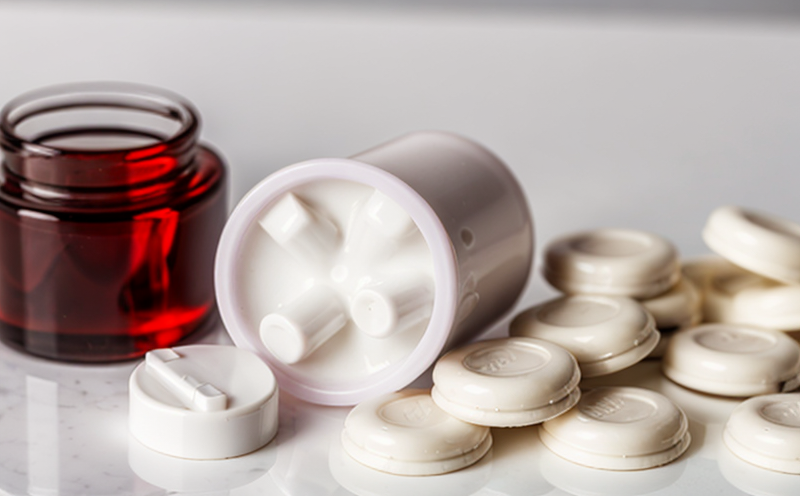USP Chewable Tablet Disintegration Testing
The USP Chewable Tablet Disintegration Test is a critical procedure in pharmaceutical quality assurance and compliance. This test ensures that chewable tablets meet the disintegration time requirements as specified by the United States Pharmacopeia (USP). The primary goal of this test is to evaluate the physical stability and dissolution characteristics of chewable formulations, ensuring they break down within acceptable limits under prescribed conditions.
The USP Chewable Tablet Disintegration Test involves placing a single tablet into a predetermined volume of water at 37°C. The tablet is agitated continuously until it disintegrates completely or reaches the specified time point. Compliance with this test ensures that the chewable tablets are safe, effective, and meet consumer expectations for ease of use.
The importance of this test cannot be overstated. Non-compliance can lead to regulatory issues, product recalls, and damage to brand reputation. The test is a crucial step in ensuring that formulations are consistent with their intended design and that they perform as expected under real-world conditions.
Compliance with the USP Chewable Tablet Disintegration Test also aligns with broader pharmaceutical quality management systems (QMS). This includes adherence to Good Manufacturing Practices (GMP) and international standards like ISO, ASTM, EN, and IEC. These standards ensure that all stages of drug development, production, and distribution meet rigorous safety and efficacy criteria.
The test is particularly relevant for oral solid dosage forms, which are the most commonly prescribed medications worldwide. Chewable tablets are especially important in pediatric populations, where ease of use is a critical factor. Ensuring that these formulations disintegrate within acceptable time frames guarantees their effectiveness and safety for all intended users.
The test setup typically involves a USP Dissolution Apparatus 2 (basket method) modified to accommodate chewable tablets. The apparatus consists of a basket, a dissolution medium (water), and a stirring mechanism. The basket is placed in the dissolution vessel, which contains the predetermined volume of water at 37°C.
The procedure for conducting this test involves placing one tablet into the basket, ensuring it is fully submerged in the water. The apparatus then begins agitation immediately after adding the tablet. The agitation continues until either the tablet disintegrates completely or reaches the specified time point (typically 15 minutes).
After the test concludes, the results are evaluated based on whether the tablet meets the USP disintegration time limits. If the tablet fails to disintegrate within the prescribed time frame, it indicates potential issues with the formulation, production process, or storage conditions.
Why It Matters
The USP Chewable Tablet Disintegration Test is essential for ensuring patient safety and drug efficacy. Non-compliance can lead to several serious consequences:
- Product Recall: Failure to meet disintegration time requirements may necessitate a product recall, resulting in significant financial losses.
- Regulatory Penalties: Regulatory bodies like the FDA and EMA may impose penalties for non-compliance with USP standards.
- Brand Reputation Damage: Non-compliance can tarnish a company’s reputation, leading to decreased consumer trust and loyalty.
Compliance with this test is not just about meeting regulatory requirements; it also ensures that the product performs as intended. This aligns directly with broader pharmaceutical quality management systems (QMS), ensuring that all stages of drug development, production, and distribution meet rigorous safety and efficacy criteria.
Applied Standards
The USP Chewable Tablet Disintegration Test is governed by the United States Pharmacopeia (USP) Chapter 800, which outlines the specific requirements for oral solid dosage forms. The test follows stringent guidelines to ensure that chewable tablets disintegrate within acceptable time frames under controlled conditions.
The USP standards are internationally recognized and widely adopted by regulatory agencies around the world, including the FDA and EMA. Compliance with these standards ensures consistency across different markets and helps maintain a high standard of quality in pharmaceutical products.
Use Cases and Application Examples
| Use Case | Description |
|---|---|
| Pediatric Medications | Ensuring chewable tablets disintegrate quickly to allow for easy consumption by children. |
| Gastrointestinal Health Supplements | Evaluating the dissolution rate of supplements designed to be taken with food or water. |
| Oral Contraceptives | Verifying the consistent disintegration time for tablets that must dissolve rapidly upon ingestion. |
| Dental Health Products | Assuring that chewable supplements designed to promote oral health break down efficiently. |
| Antacids | Evaluating the rapid dissolution of antacid tablets for quick relief of heartburn and indigestion. |
| Vitamin Supplements | Ensuring that chewable vitamin supplements disintegrate to release their active ingredients effectively. |





